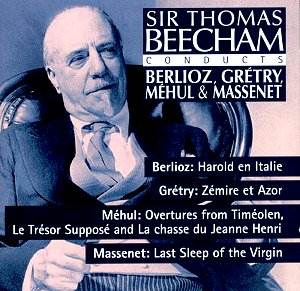AVAILABILITY
www.sonyclassical.co.uk
Beecham performed Harold in Italy with three
elite violists, all British. The earliest performance, so far
as is known, was with Lionel Tertis in 1933, the middle ones were
with William Primrose and the last with Frederick Riddle. Although
no trace of his collaboration with Tertis now survives, fortuitously
this commercial Primrose recording has been augmented recently
by the 1956 Edinburgh performance with Riddle on BBC Classics.
Comparisons are, as ever, instructive. In the 1951 Primrose recording
the first movement repeat wasn’t taken – unlike the Edinburgh
broadcast – and there are commensurate gains in tension in the
live context whilst also losses in terms of audience coughing,
a few intonational concerns and a greater sense of the explication
of the luminous orchestration in the studio. Riddle-Beecham is
rather more full of nervous energy and declamatory élan
in the opening, with the soloist slightly slower and more ruminative
than Primrose-Beecham. In the second movement one is faced with
the studio veil of exquisite tonal shading or the live performance’s
infinitesimally greater sense of lyrical curve in the détaché
writing. Of the two recorded sounds the Usher Hall is less ingratiating,
the studio richer. Of the soloists Primrose is the more poised,
but he had the advantage of studio retakes, and Riddle’s understanding
of Beecham’s cantilever is distinguished. This is the only extant
example of Riddle’s Harold whilst Primrose of course set down
recordings with Koussevitzky and Munch. Incidentally his first
Harold was when he was co-principal of the NBC with Toscanini
conducting, a private recording of which the Italian conductor
invited the Scotsman to hear. I assume it’s still extant – a suitable
case for Guild (unless I’ve missed a commercial release of it
somewhere)?
This all-French disc is additionally graced by
some long unavailable material. The Méhul gets some cracking
work from Beecham. The trumpets punch out in Timoléon
and the strings slash over the dramatic double basses. Works
like this were the fruit of Beecham’s long-held fascination with
late eighteenth century French music, fuelled by hours in the
Bibliothèque Nationale and Parisian bookshops in the first
decade of the twentieth century. He is very much the Grand Seigneur,
full of lyricism and swagger in the overture to Le Trésor
Supposé, and strong on exultant power. The biggest
of the trio of Méhul overtures is that for La Chasse
du Jeune Henri (strangely mis-titled on the disc as La
Chasse de Jeanne Henri) which features the distinguished
contributions of Jack Brymer and Gwydion Brooke. The suspenseful
string figuration ratchets up the tension, added to by Dennis
Brain’s immaculate horn calls, the marvellously vigorous but subtle
playing an apt reflection of Beecham’s affection for and interest
in the work. Balance is superb, the drama and vigour are predominant,
bagpipe drones are irresistible in their immediacy and everything
opens out into blazing sunlight. Beecham described this kind of
thing as Chivalric Romance and that’s quite as he plays it, not
least the blazing climax. Grétry’s Pantomime from Zémire
et Azor is one of my Beecham favourites but not in this performance.
I much prefer the touching intimacy of his 1940 LPO recording
with its touching single line string leave-taking to this rather
plumped up affair but the Massenet Last Virgin, as Beecham used
to put it, is beautifully veiled and intimate.
The 1951-54 monos sound full of subtlety and
depth in these transfers and Melville-Mason’s notes are characteristically
full of acumen and period interest – I’m glad he hasn’t relied
on Gramophone reviews, as he is sometimes prone to do. An exciting,
invigorating disc.
Jonathan Woolf
